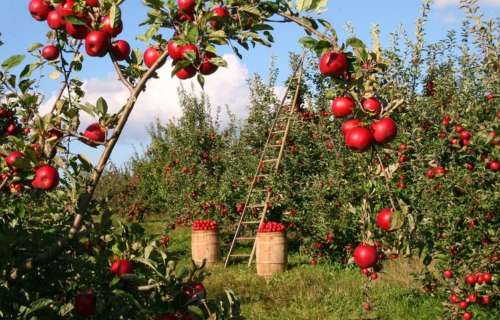
“Intelligent orchards,” bees for biocontrol of insects and disease, and reduced food and water waste are among four University of Guelph research applications recently awarded more than $660,000 in funding from a sustainable food grant program supported by George Weston Ltd. and Loblaw Companies Ltd.
The funding for researchers from three U of G colleges will come from the Seeding Food Innovation Grants program offered by both companies. The program provides up to $250,000 for two years for collaborative research intended to increase food production for a growing population in ways that are environmentally, economically and culturally sustainable.
“This support from George Weston Ltd. and Loblaw Companies Ltd. will help University of Guelph experts to turn ideas into sustainable products and solutions,” said Malcolm Campbell, vice-president (research). “From improving pest control to reducing food waste to incorporating Indigenous values into food production, U of G researchers are finding ways to make lasting impacts in the world.”
“Every year, we are delighted to see the breadth of applications that come from the University of Guelph,” said Tamara Rebanks, vice-president of community investment at George Weston Ltd. in Toronto.
Explaining that the program supports innovative projects with national and international impacts, she said, “Guelph researchers received half of our available funds last year, so it truly shows the strength of the University of Guelph’s research collaborations in this highly competitive application process.”
Better orchard production
Plant agriculture professor John Cline will work with U of G engineers Andrew Gadsden and Mohammad Biglarbegian on using machine vision and artificial intelligence to better manage orchard production.
Working at U of G’s Simcoe research station, the trio will develop a prototype system to count spring flowers on apple trees. Growers might use that information to thin their orchards and yield higher-quality fruit.
“This would give growers an early guess at what their crop is going to look like in the fall,” said Cline, who studies trellised apple production as well as production of peaches and cherries. Apples are more uniform and easier to work with, he said, adding that “there’s no reason why the technology developed here could not be used for other fruit crops.”
Using their $134,066 award, the researchers aim to develop a prototype system to estimate yields. Cline envisions a camera system mounted on a cart – perhaps even an autonomous vehicle – that might learn to distinguish blossoms from foliage and estimate fruit quantity.
The team – which also includes Amanda Green, a fruit crop specialist with the Ontario Ministry of Agriculture, Food and Rural Affairs in Simcoe, Ont. – is working with two robotics companies.
Honeybees to fight fungus
Another team based in the School of Environmental Sciences (SES) will use $237,680 to study the use of honeybees to carry microbial agents that control insect pests and fungal diseases in strawberry production.
Unlike conventional application of biocontrol agents, bee vectoring allows continuous, precise application of such agents to strawberry flowers while providing pollination services that improve fruit quality, said University Professor Emeritus Peter Kevan.
Kevan, who helped lead development of bee vectoring, will work with Susan Chan, a PhD candidate in SES as well as plant agriculture professor Katerina Jordan and farm organizations and biocontrol agent manufacturers.
“This collaborative project will result in the commercialization of two new biocontrol products in Canada, increasing the number of plant protection tools available to strawberry growers and giving them alternatives to chemical pesticides,” said Chan, adding that the project will educate growers and beekeepers about the use of bee vectoring.
Increase manomin production
Engineering professor Andrea Bradford and history professor Brittany Luby will use $186,400 to enhance manomin (wild rice) production in northwestern Ontario.
In partnership with Niisaachewan Anishinaabe Nation, they will study causes of crop declines on the Winnipeg River. “It is a crop of incredible cultural importance to the Anishinabeg, who have experienced exponential declines in yield since the 1950s,” said Luby.
An estimated $500,000 worth of manomin is lost each year in the region, likely to a combination of pollution, disruptions to water flow and invasive species.
The U of G researchers are working with community knowledge keepers to develop culturally appropriate crop management techniques responsive to settler-imposed changes, said Luby.
Technology to clean fresh produce
Reducing food waste by preventing spoilage, conserving water and reducing pesticide residues on fresh produce are the goals of a project that will receive $104,480.
Food science professor Keith Warriner will study advanced oxidative process-based treatments to clean fruits and vegetables, preventing bacterial spoilage and removing pesticides. He’s working with environmental sciences professor Ryan Prosser; Tatiana Koutchma, a researcher at Agriculture and Agri-Food Canada in Guelph; and Clean Works Corp. in Beamsville, Ont.
Producers use lots of water to wash produce, but washing doesn’t necessarily destroy pesticide residues, said Warriner.
In earlier award-winning research, he combined UV light and ozone to kill pathogens on produce – a technology already being used to extend shelf life and control pathogens on lemons and grapes in California.
“This new research will adapt that process to control spoilage bugs that are much tougher and more resistant,” he said.